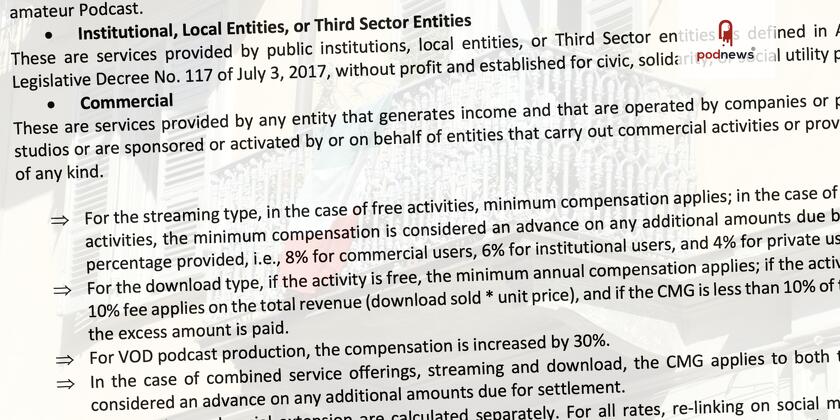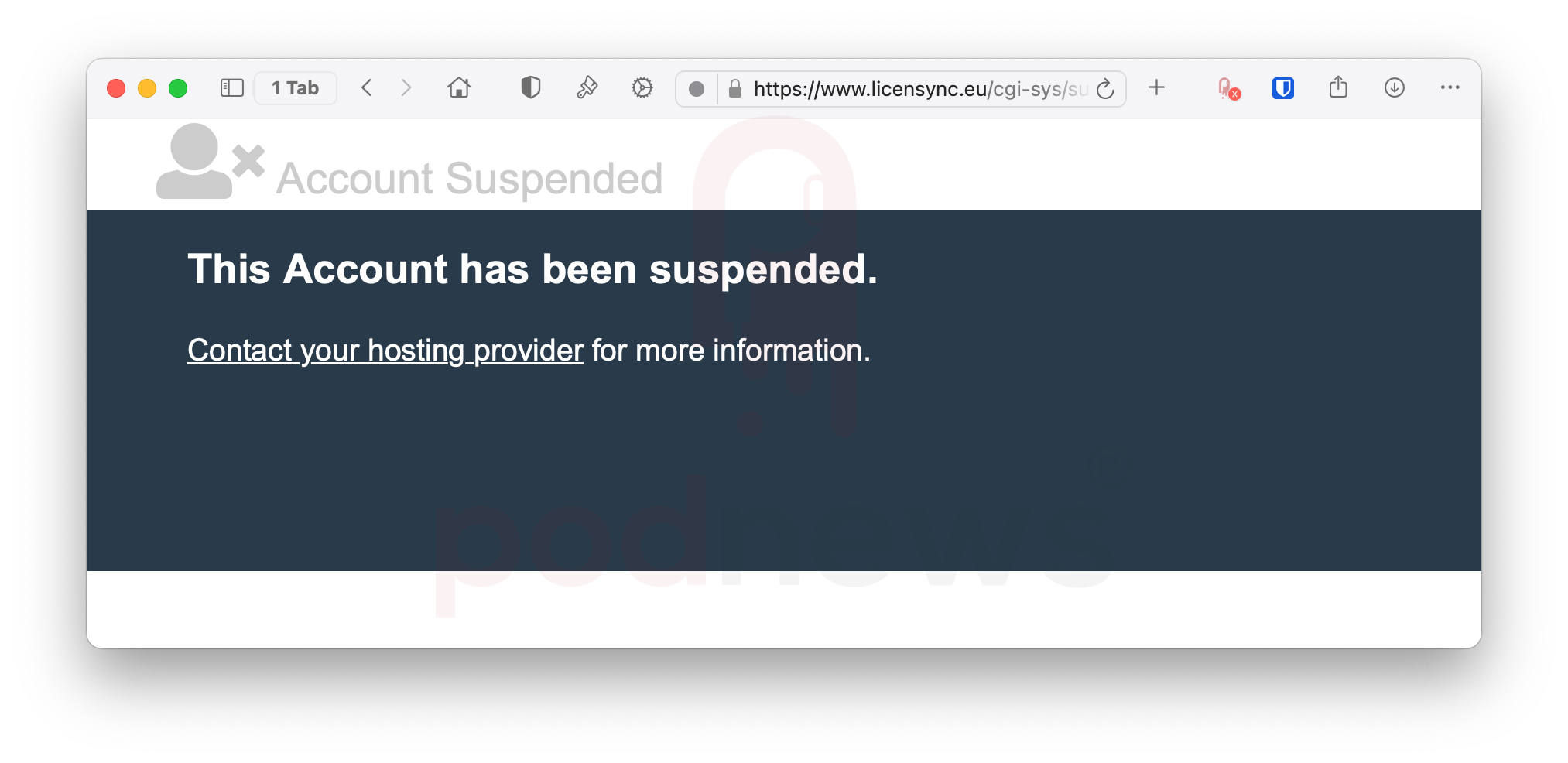
$1,000 for listing a podcast: examining Licensync

This article is at least a year old
Exclusive: A company in Italy is sending invoices for more than $7,300 to multiple podcast directories and apps for listing six Italian podcasts.
Licensync has sent a number of podcast directories a legal-looking claim for payment: for listing just six openly-available podcasts that it says are members.
Rachele Bonani is the founder and President of Licensync (signing her emails CEO). The company describes itself as “the first Collective Management Organization dedicated to digital-native works, including podcasts, vodcasts, and web-based journalism.”
In an email to Podnews, copied to the organisation’s lawyer, Bonani explained that in her view: “Similar to other creative works, podcasts require appropriate licensing to guarantee that creators receive fair compensation for their use, irrespective of the distribution method.”
She continued: “Platforms claiming to be pure indexing services must always provide the original link. However, our analysis shows that many platforms impose mandatory registration, often coupled with intrusive profiling, and integrate advertising without transparently disclosing these practices in their terms of service. These platforms often monetize the extensive breadth of their catalog rather than the actual streams. Our inquiry is conducted solely to protect the interests of rights holders. If a platform truly offers free services without exploiting user data or profiting from advertising, it will not be subject to additional fees and will qualify for our no-profit rate.”
In other words, Licensync considers that they can charge a fee for listing one of their members’ podcasts, even if platforms don’t make any money from their users.
Invoices are sent requiring payment within seven days, accompanied by an email peppered with legalese. The emails - sometimes only sent in Italian - contain a licence agreement for signature, and an official-looking email address marked “PEC Legal”, which is, in fact, just a certified email service used by the Italian government among others.
We have obtained a copy of the “licence”. It requires free marketing for Licensync with a mandatory logo and link on websites, requires that companies share personal data of its users with Licensync, and also insists on a full usage report and an income declaration. A company that linked to all six podcasts in Licensync would be liable for a minimum of €12,000 per year. If podcasts have video in them, the rate rises 30%. If a company links to a podcast on social media, the rate rises another 20%. Most importantly - the whole thing is only valid within Italy anyway.

Not how this works
“With most podcast directories, there is no copying and no distribution,” Lindsay Bowen, a Lawyer for Podcasters, told us. “In podcasting, the files are made available by the podcasters themselves with the intention of distributing them widely. The rights holders agree to such wide distribution when they list them with many popular directories. A few services cache copies of audio files and redistribute those copies, but all of those get explicit permission when the podcaster or network lists the RSS feed."
A number of popular podcasting services use the Apple Podcasts directory (including us), so shows are automatically imported and used via RSS - the very purpose of the technology. You can opt-out of Apple Podcasts sharing your RSS feed in the directory. Few do.
Podnews LLC operates under the terms of the DMCA, with a clear reporting procedure under US law. Licensync hasn’t contacted us at all about our directory; but for other companies it has approached, it has not appeared to use those provisions.
How to spot a member
So, how can you tell who is a member of this organisation? There’s no easy way to tell - individual podcast RSS feeds have no mention of Licensync’s apparent involvement, and when we asked, we were directed to this list of individuals on the website.
The English version of the website lists three Italian-language podcasts, while, confusingly, the Italian version lists thirteen (including one duplicate). Neither list the RSS feeds.
Podnews asked the company how to programmatically detect podcasts that are members of the service. The company responded “we are working on tools to make identification and compliance straightforward”, and that it’ll take some time to achieve: “once fully integrated into the Licensync roster and aligned with the international CISAC system (a process currently underway and expected to take three years from our date of constitution), our works will be searchable using these internationally recognized tools. Until then, we remain available to provide detailed information directly.”
However, Licensync is not a member of CISAC, nor has it applied to be one. We have asked CISAC whether it is working with Licensync, and whether CISAC has any ambition to list podcasts in its database; it has not responded.
AGCOM, the Italian communications regulator, lists Licensync as a registered collection agency on its website. This is claimed by Licensync as a “verification reference” - but it only verifies that the company has registered as a collection agency, not that it has the right to charge for linking to podcasts.
Partners
On its website, the company lists three partners - ASSIPOD, the association of Italian podcasting; Podstar, and the Italian Festival of Podcasting.
Podstar and the Italian Festival of Podcasting are both run by Ester Memeo, who is also a director of Assipod, and has run webinars about Licensync.
Memeo tells Podnews that Licensync have been a sponsor of the Festival and a podcast; and that only one of her podcasts, Podcast per il Business, is listed with the organisation. (In fact, Licensync also lists the one they sponsored, Merce di Scambio, which is published by Podstar).
“I’m not familiar with their methods or how they’re managing international rights for digital content,” she tells us, “so I’ll make it a priority to contact them right away to get some answers and sort this out. When I published my podcast on Apple Podcasts and other platforms, I personally authorized the distribution of my RSS feed. So, these platforms shouldn’t be involved in any revenue claims from Licensync.”
We asked Giulio Gaudiano, the president of ASSIPOD, why the association is listed as a partner. Assipod responded (their bold):
Associazione Italiana Podcasting has no partnership with Licensync. Since it had already been brought to our attention that the association’s logo was used on their website without authorization, we have contacted them to request the removal of our logo and any references that might create confusion or suggest a connection between our organizations. Unfortunately there was no action taken so far.
Giulio told us that “both personally and as President of ASSIPOD, I deeply value open podcasting and am committed to doing everything necessary to preserve and promote it. I do know Rachele and Carmine personally - but I do not align with their approach.”
Podcast apps
One of the founder members of ASSIPOD is Franco Solerio. He runs the popular podcast app Castamatic. We asked him whether he pays a licence for listing these shows. He has clarified that Castamatic does not, telling us: “Castamatic’s only reason of existence is to keep podcasting open and free of gatekeepers. If any entity should ask for money to license their podcasts my only way to deal with that would be to remove their shows from search results.”
We also asked Licensync whether Apple Podcasts or Spotify were paying Licensync’s licence. Licensync did not indicate that they were. We note that Licensync links to many different podcast services from its own website; yet, it has not achieved a licence with any, so far as we are aware.
Opinion
We think the methods of Licensync are naïve, dishonest, and bad for podcasting.
Creators knowingly list their podcasts on open RSS with the intention of being listed in the many services that use RSS: and then this company comes along and tries to take payment. It’s a trap.
Paid for podcasts exist in many guises - on Audible, via Apple and Spotify’s paid services, through services like Podimo and others. This is how to achieve “pay per play” licensing - not to dupe companies into paying a “licence” for linking to a podcast that the creator has deliberately shared.
We’ve seen this before - with a company trying to extract money for podcast artwork. We’ll doubtless get it again.
Rachele Bonani, Licensync’s President, and Carmine La Pietra, Licensync’s Treasurer, also make a podcast about true crime, which focuses on the Mafia. The Sicilian Mafia’s core activity is protection racketeering. The show is “produced by Licensync Production”.
Podcasting lacks an industry association that can act to protect our industry from rackets like this one. Until we fix this and work together for podcasting’s benefit, we’ll get more spurious emails from companies like this, hoping to share in podcasting’s success.
This article was updated on Dec 17 with responses from ASSIPOD and Giulio Gaudiano.
A month later…
When visiting the company’s website a month after initially publishing this story, it had been suspended.



































































































